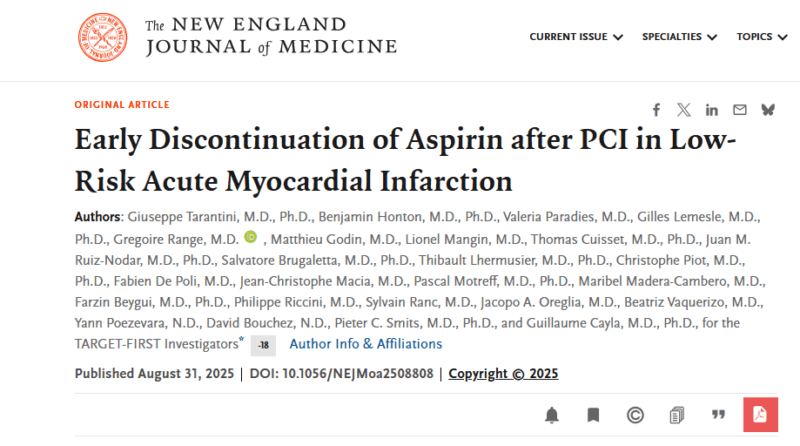
Abdulla A. Damluji: Early Aspirin Discontinuation After PCI Safe in Low-Risk Heart Attack Patients – TARGET-FIRST Trial
Abdulla A. Damluji, Director of the Cardiovascular Center on Aging at Cleveland Clinic, has shared a post on LinkedIn:
“The optimal duration of dual antiplatelet therapy following percutaneous coronary intervention for acute myocardial infarction remains a subject of ongoing research. While dual antiplatelet therapy is a cornerstone of secondary prevention, prolonged use increases the risk of bleeding. Recent studies have explored shortened regimens, particularly in patients with high bleeding risk. However, evidence remains limited regarding early aspirin discontinuation specifically in patients with acute myocardial infarction who are at low ischemic and bleeding risk.
The TARGET-FIRST trial, published in the New England Journal of Medicine in August 2025, provides important new data on this topic. The trial evaluated whether early aspirin withdrawal followed by continued P2Y12 inhibitor monotherapy is safe and effective in patients with low-risk acute myocardial infarction after successful and complete revascularization.
Trial Design and Population
TARGET-FIRST was a prospective, multicenter, open-label, randomized controlled trial conducted across 40 sites in Europe. It enrolled 2,246 patients with ST-elevation or non-ST-elevation myocardial infarction who underwent complete revascularization with a biodegradable polymer rapamycin-eluting stent. After one month of uneventful dual antiplatelet therapy (aspirin and a P2Y12 inhibitor), 1,942 patients were randomized in a 1-to-1 fashion to:
- Discontinue aspirin and continue P2Y12 inhibitor monotherapy
- Continue dual antiplatelet therapy for an additional 11 months
The study population was carefully selected. All patients had low ischemic and bleeding risk based on prespecified criteria and had undergone complete revascularization. The average age was 61 years. Over 78 percent of patients were men, and the majority had single-vessel disease. Approximately half presented with ST-elevation myocardial infarction.
Primary and Secondary Outcomes
The primary outcome was a composite of death from any cause, myocardial infarction, stent thrombosis, stroke, or major bleeding (defined as Bleeding Academic Research Consortium type 3 or 5 bleeding) at 11 months after randomization. The main secondary outcome was clinically relevant bleeding, defined as Bleeding Academic Research Consortium type 2, 3, or 5 bleeding.
Key findings include:
- The primary outcome occurred in 2.1 percent of the monotherapy group and 2.2 percent of the dual therapy group
- The absolute difference was minus 0.09 percentage points with a 95 percent confidence interval from minus 1.39 to 1.20
- This result met the predefined noninferiority margin of 1.25 percentage points (P = 0.02)
- Clinically relevant bleeding occurred in 2.6 percent of the monotherapy group and 5.6 percent of the dual therapy group
- The hazard ratio for bleeding was 0.46 with a 95 percent confidence interval from 0.29 to 0.75 (P = 0.002 for superiority)
Stent thrombosis was extremely rare in both groups. Definite or probable stent thrombosis occurred in one patient in the monotherapy group and none in the dual therapy group. Other ischemic endpoints, including cardiovascular death and myocardial infarction, were similar between groups.
Interpretation
This trial demonstrates that in a carefully selected low-risk population with acute myocardial infarction, early discontinuation of aspirin after one month of dual therapy is noninferior to continuing dual therapy for preventing ischemic and cerebrovascular events. Furthermore, P2Y12 inhibitor monotherapy significantly reduces clinically relevant bleeding.
The event rates were lower than anticipated, likely reflecting modern stent platforms, high procedural success, and adherence to optimal medical therapy. Most patients were treated with potent P2Y12 inhibitors, primarily ticagrelor or prasugrel, which may have contributed to low ischemic event rates.
Clinical Implications
The results of TARGET-FIRST support a tailored approach to antiplatelet therapy in patients with acute myocardial infarction. In individuals who are stable one month after complete revascularization and have low ischemic and bleeding risk, it may be reasonable to stop aspirin and continue with P2Y12 inhibitor monotherapy.
This strategy may not be appropriate for all patients. TARGET-FIRST excluded individuals with complex coronary anatomy, multivessel disease, renal dysfunction, anemia, or those requiring oral anticoagulation. The findings therefore may not apply to higher-risk or more heterogeneous populations.
The study differs from STOPDAPT-2 ACS, which failed to show noninferiority of one month of dual therapy in a higher-risk group. In contrast, TARGET-FIRST required anatomically complete revascularization within seven days of myocardial infarction, which likely reduced residual ischemic risk and contributed to the favorable outcomes.
Conclusion
In low-risk patients with acute myocardial infarction who have undergone early and complete revascularization, P2Y12 inhibitor monotherapy after one month of dual therapy was noninferior to continued dual therapy in preventing ischemic events and resulted in significantly less bleeding. TARGET-FIRST supports consideration of early aspirin discontinuation in a defined subgroup of stable, well-revascularized patients treated with contemporary stent technology and guideline-directed medical therapy.
As with all clinical decisions, antiplatelet strategies should be personalized based on the patient’s risk profile, clinical stability, and procedural context.”
Title: Early Discontinuation of Aspirin after PCI in Low-Risk Acute Myocardial Infarction
Authors: Giuseppe Tarantini, Benjamin Honton, Valeria Paradies, Gilles Lemesle, Gregoire Range, Matthieu Godin, Lionel Mangin, Thomas Cuisset, Juan M. Ruiz-Nodar, Salvatore Brugaletta, Thibault Lhermusier, Christophe Piot, Fabien De Poli, Jean-Christophe Macia, Pascal Motreff, Maribel Madera-Cambero, Farzin Beygui, Philippe Riccini, Sylvain Ranc, Jacopo A. Oreglia, Beatriz Vaquerizo, Yann Poezevara, David Bouchez, Pieter C. Smits, Guillaume Cayla.

Read the full article here.
Stay informed with Hemostasis Today.
-
Jan 22, 2026, 15:36We Must Roll Up Our Sleeves And Help: José Antonio García Erce on Plasma Donation
-
Jan 22, 2026, 15:25Nita Radhakrishnan on Challenges In Congenital Afibrinogenemia
-
Jan 22, 2026, 15:10Jin Q Gives a Summary of 2025’s Most Impactful Cell and Gene Therapy Milestones
-
Jan 22, 2026, 14:57Nirav Dhanesha on CD14 Acting As A Functional Driver of DVT
-
Jan 22, 2026, 11:41Jamilla Goedegebuur and Colleagues on VTE Management in Case of PAD
-
Jan 22, 2026, 11:28Abdulrahman Katib on API-CAT Trial’s Evaluation of Apixaban Dosing
-
Jan 22, 2026, 11:19Bruno Odisio: Ablation Margins Are Software-Dependent
-
Jan 22, 2026, 10:38Pedro Perez: The VTE Market Is Clearly Entering Its Next Phase
-
Jan 22, 2026, 10:29Marvin Garcia Reyes Presents a Case of Aorto-Visceral and Aorto-Iliac Thrombosis
